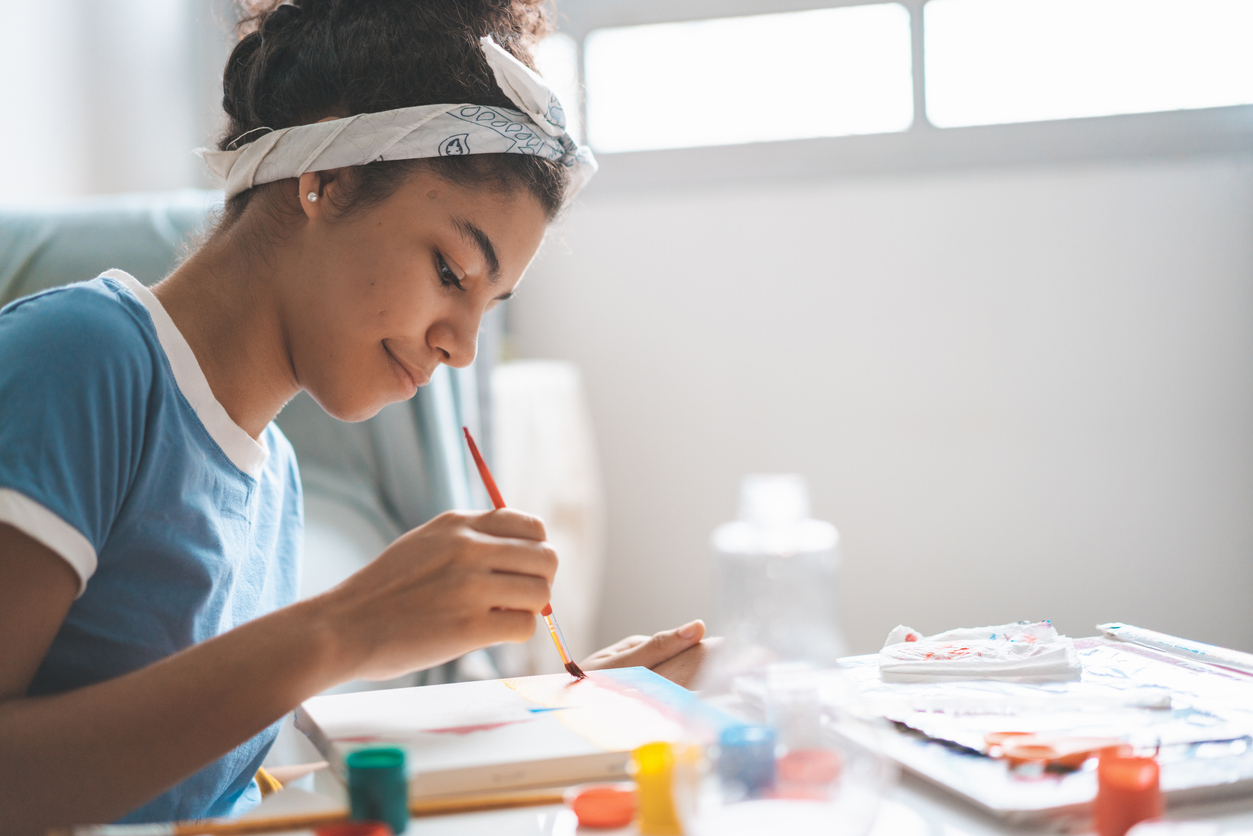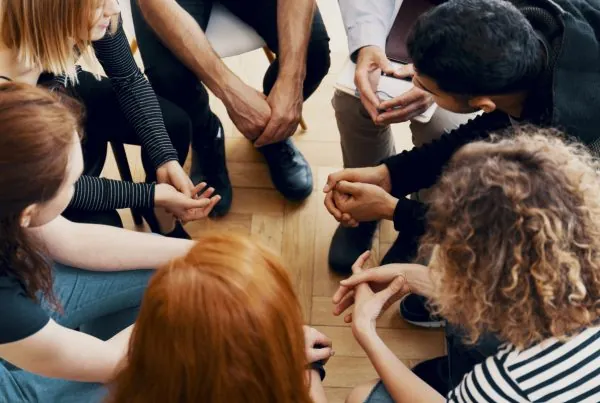15 Group Therapy Activities for Teens – Visions Treatment Centers
Exploring therapy activities for teens offers numerous benefits, including enhancing emotional expression, promoting self-awareness, and fostering resilience. These activities provide a safe space for teens to explore and understand their feelings, develop coping strategies, and build confidence through group activity, ultimately improving emotional regulation. Engaging in therapy can also improve communication skills, support mental health, and encourage positive behavioral changes, which are crucial for adolescent development and well-being.
Looking for healthy therapy activities for teens? Therapy activities for teens are not just about talking; they involve creative, engaging, and effective methods to help teens express themselves, understand their emotions, and build essential life skills.
Imagine your teen learning to manage stress, communicate better, and gain confidence through fun and therapeutic activities. These activities are designed to resonate with teens, making therapy something they look forward to rather than shy away from.
In this article, we explore 15 healthy therapy activities for teens to explore.
Engaging in healthy therapy activities offers significant mental health benefits for teens.
These activities are tailored to meet the unique developmental needs of adolescents, providing them with tools to navigate emotional challenges. They foster self-awareness and emotional intelligence, which are crucial during these formative years.
Through such activities, teens learn to articulate feelings, manage stress, and develop coping mechanisms. This proactive approach to mental wellness addresses current issues and equips teens with lifelong skills for emotional resilience. By participating in these therapeutic activities, teens can build a strong foundation for their mental health and overall well-being.
Here are some teen therapy activities that can help improve and support mental health and well-being.
Introduction
Group therapy is a powerful tool for supporting adolescents as they navigate the therapeutic process and the challenges of growing up. It provides a safe space for teens to connect with peers and work through personal issues. Effective group activities can help engage participants, foster personal growth, and aid mental health treatment. Group therapy can help individuals learn new coping skills, work on building their future self, and master their communication skills alongside others. It can be used to address various issues, such as academic stress, emotional growth, and self-care.
Benefits of Therapy for Mental Health
Therapy is a highly effective way to improve mental health and well-being in teens. By participating in therapy activities, adolescents can develop essential coping skills, build resilience, and enhance their overall mental health. Therapy provides a safe and supportive environment for teens to express themselves, explore their emotions, and develop healthy relationships. Through therapy, teens can learn to manage stress, anxiety, and other emotional challenges, leading to improved mental health outcomes and a stronger sense of self.
Expressive Arts Group Therapy
Expressive arts aren’t limited to a single canvas or medium. During expressive arts therapy, teens are encouraged to utilize a variety of mediums to express what they might not be able to via face-to-face communication, on paper, or through their voice. A creative outlet can be freeing, but it can also be an opportunity for greater self-awareness and introspection.
Group members can collaborate on art projects, sharing their creative expressions and fostering a sense of community and mutual understanding.
Outdoor Group Activities
The benefits of the great outdoors on the human psyche are well established. We have a connection to nature, and spending more time around it can help us feel calm, improve our mood, and even positively impact our physical health – more so than just walking around.
Mindfulness Meditation for Mental Health
Meditation techniques can be difficult to learn, but mindfulness exercises focus on bringing a step-by-step approach for teens to learn how to live in the moment and reap the mental benefits of side-stepping rumination or a negative spiral. These exercises are often incorporated into a therapy session, providing a structured environment where teens can practice mindfulness, focus on the present moment, and enhance their well-being.
Journaling for Coping Skills
Consistently writing down your daily thoughts and experiences – whether in a structured diary entry, a dotted list of keywords, or via stream-of-consciousness – can help teens reflect on their experiences, review emotional outbursts or strong feelings with a sense of introspection, and focus on the good versus the bad. Journaling can also be incorporated into motivational group therapy activities, where teens share their entries and provide supportive feedback to each other.
Music Therapy
Just like expressive art therapy helps teens convey emotion through a physical medium, music therapy aims to help teens do the same via music. Some teens are not just musically inclined but actually have a much greater emotional connection to music and can feel and share much more through sound than through words or pictures. Collaboration is also a crucial part of music, emphasizing social skills.
In teen group therapy, music can be used as a tool for connection, allowing participants to create and share music together, fostering a sense of unity and collaboration.
Animal-Assisted Therapy
Working with and caring for animals can help calm teens, give them a sense of purpose, and boost their self-esteem. Animal-assisted therapy also takes advantage of the fact that we feel better when we’re doing something for someone else. It helps teens cultivate feelings of responsibility toward others and practice empathy, learning to relate to people with greater compassion. Therapy groups involving animals can help teens build trust and empathy as they work together to care for and interact with the animals.
Yoga
YogaTeenagersines physical activity with mindfulness and relaxation through practicing learning to incorporate and explore a new kind of exercise while learning to practice mindfulness through a physical approach.
Group therapy sessions that include yoga can help teens learn to relax and connect with their peers through shared physical and mindfulness practices.
Adventure Therapy
Adventure therapy emphasizes teamwork in outdoor and indoor environments through obstacle courses or even escape rooms. These help teens learn to work together and foster important social skills. Each group member plays a crucial role in adventure therapy activities, working together to overcome challenges and build trust.
Drama Therapy
Drama therapy utilizes roleplaying and stage preparation (including prop and costume creation) to help explore different roles and discuss therapeutic lessons through the lens of a figure or character, especially for teens who aren’t otherwise able to process their own experiences at the moment.
Volunteer Work
Spending time giving back to others can be cathartic and deeply rewarding. Volunteer work teaches teens to benefit from selflessness and aspire to continue to leave a positive impact on other people around them while expecting nothing in return.
Narrative Therapy
While drama therapy focuses on each of the elements necessary in theater, narrative therapy focuses specifically on harnessing your own experiences as a tool for therapy in teens who might benefit from learning to re-explore their lives through a different, more positive, and more constructive lens.
Dance Therapy
While some teens use music or a canvas to express themselves, others can use their bodies through dance. Dancing as a form of exercise, creative expression, and even a form of active mindfulness helps teens process their emotions and experiences positively.
Mind-Body Connection Exercises
For teens who might not necessarily respond to yoga or dance, there are other mind-body connection exercises, including breathing exercises, self-practicing martial arts, and even weight training.
Cooking or Baking Classes
Cooking and baking are valuable life skills, but they also help teens explore a different kind of constructive creativity while directly benefiting from their labors of love.
Coping Skills and Stress Management
Coping skills are essential for teens to manage overwhelming emotions and stress. Group therapy activities can help teens develop healthy coping skills and reduce stress. For example, the “Worry Journal” activity encourages teens to write down their thoughts and feelings, helping them identify patterns and develop strategies to manage their worries. The “Gratitude Scavenger Hunt” activity helps teens focus on the positive aspects of their lives, promoting a positive attitude and increasing their well-being. These activities can be adapted to suit the needs and preferences of the group, making them an effective tool for promoting positive mental health. Additionally, focusing on the present moment through activities like gratitude mapping and grounding exercises can further enhance mindfulness and self-awareness, aiding in stress relief during challenging times.
Social Skills and Communication
Group therapy activities can help teens develop social skills and improve communication. The “Human Knot” activity encourages teamwork and communication, helping teens develop problem-solving skills and build trust with their peers. The “Two Truths and a Lie” activity helps teens build connections and learn more about their peers, promoting social skills and empathy. These activities can be used in conjunction with other therapy activities to enhance the therapeutic process, promoting positive mental health and personal growth.
Family and Social Connections
Therapy activities can also help teens build and maintain positive family and social connections. By participating in group therapy activities, adolescents can develop essential social skills, such as communication, empathy, and conflict resolution. These skills are crucial for building and maintaining healthy relationships with family and friends. Additionally, therapy can help teens navigate complex family dynamics and develop strategies for managing conflicts and improving relationships.
Building Positive Thinking and Resilience
Therapy activities can also help teens build positive thinking and resilience. By participating in activities such as art therapy, mindfulness, and meditation, adolescents can develop a more positive outlook on life and learn to manage stress and anxiety. These activities can also help teens develop a growth mindset, learn to reframe negative thoughts, and build resilience in the face of challenges. By building positive thinking and resilience, teens can improve their overall mental health and well-being, leading to a happier and healthier life.
Self-Esteem and Confidence
Group therapy activities can help teens develop self-esteem and confidence. The “Self-Compassion Pause” activity encourages teens to be kinder to themselves, helping them develop a more positive self-image. The “Compliment Circle” activity helps teens feel valued and appreciated, boosting their self-esteem and confidence. These activities can be used to promote positive mental health and personal growth, fostering greater self-awareness and helping teens develop a more positive outlook on life.
Conclusion
Experiential therapies and therapeutic activities can be more engaging than group therapy or individual therapy sessions in a classroom or residential setting.
Sometimes, engaging with teens on a physical or creative level helps them better understand the lessons taught during therapy and helps them internalize their treatment goals. These experiences also help create lasting memories that teens can draw on later in life.
We at Visions focus on holistic treatments. We believe that it is essential to provide a multimodal approach to mental health treatments, and our teen treatment programs help teens cultivate a large repertoire of valuable tools for their long-term mental health while addressing the current of their condition. Contact us today to learn more about our residential treatment program and other treatment modalities.








